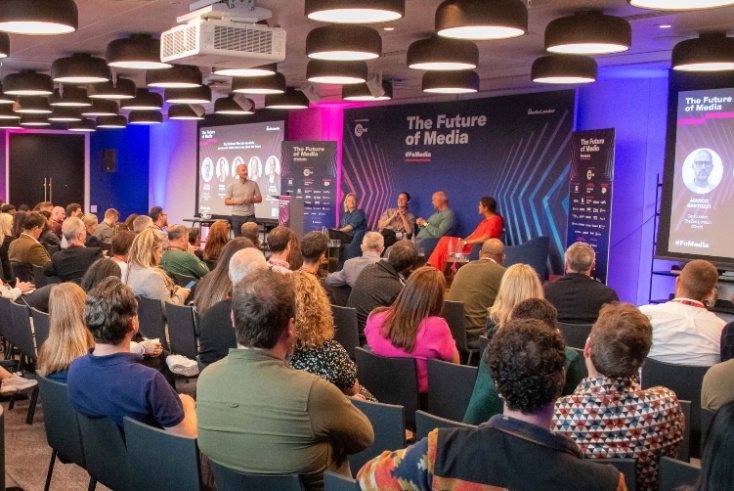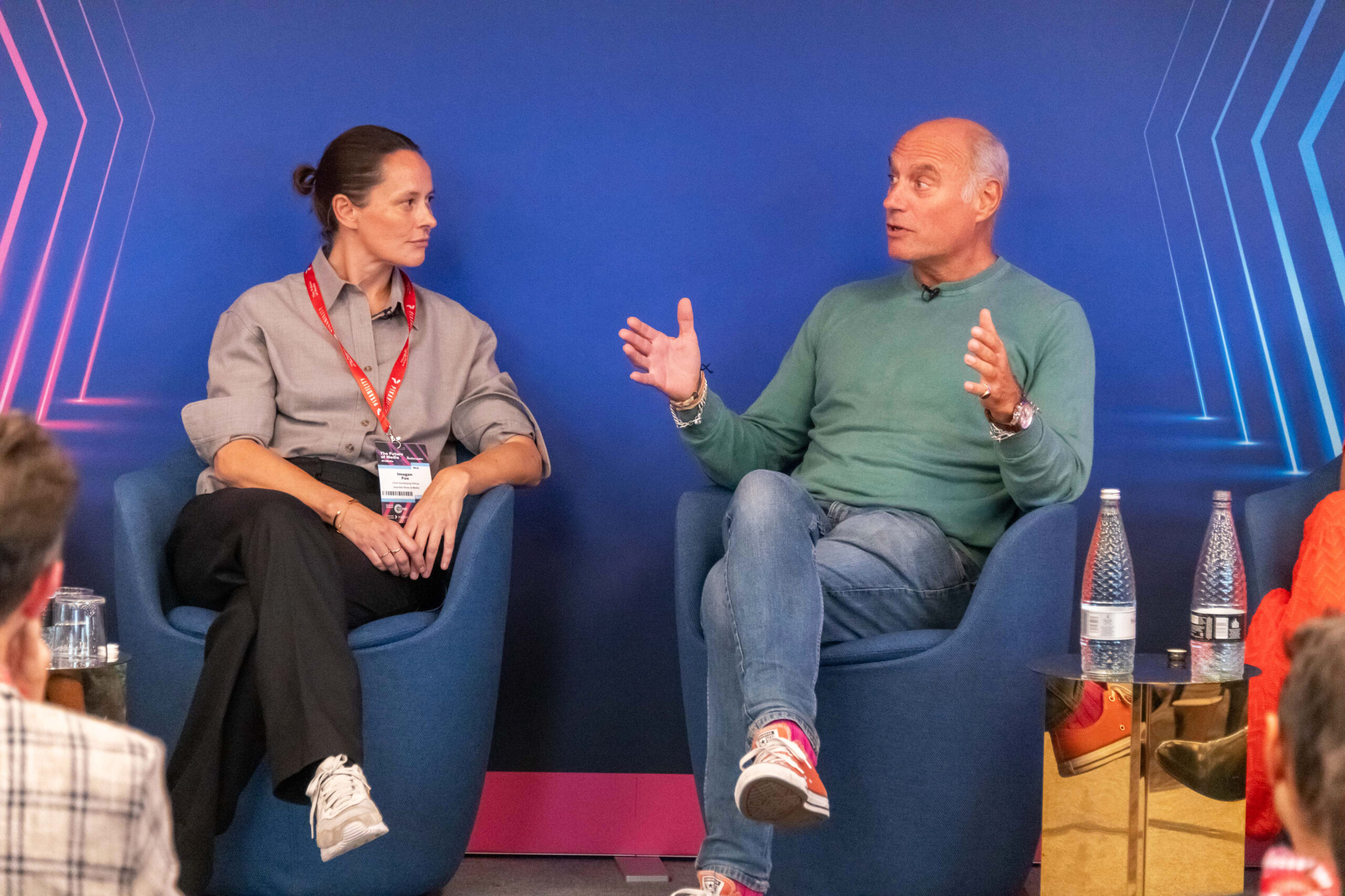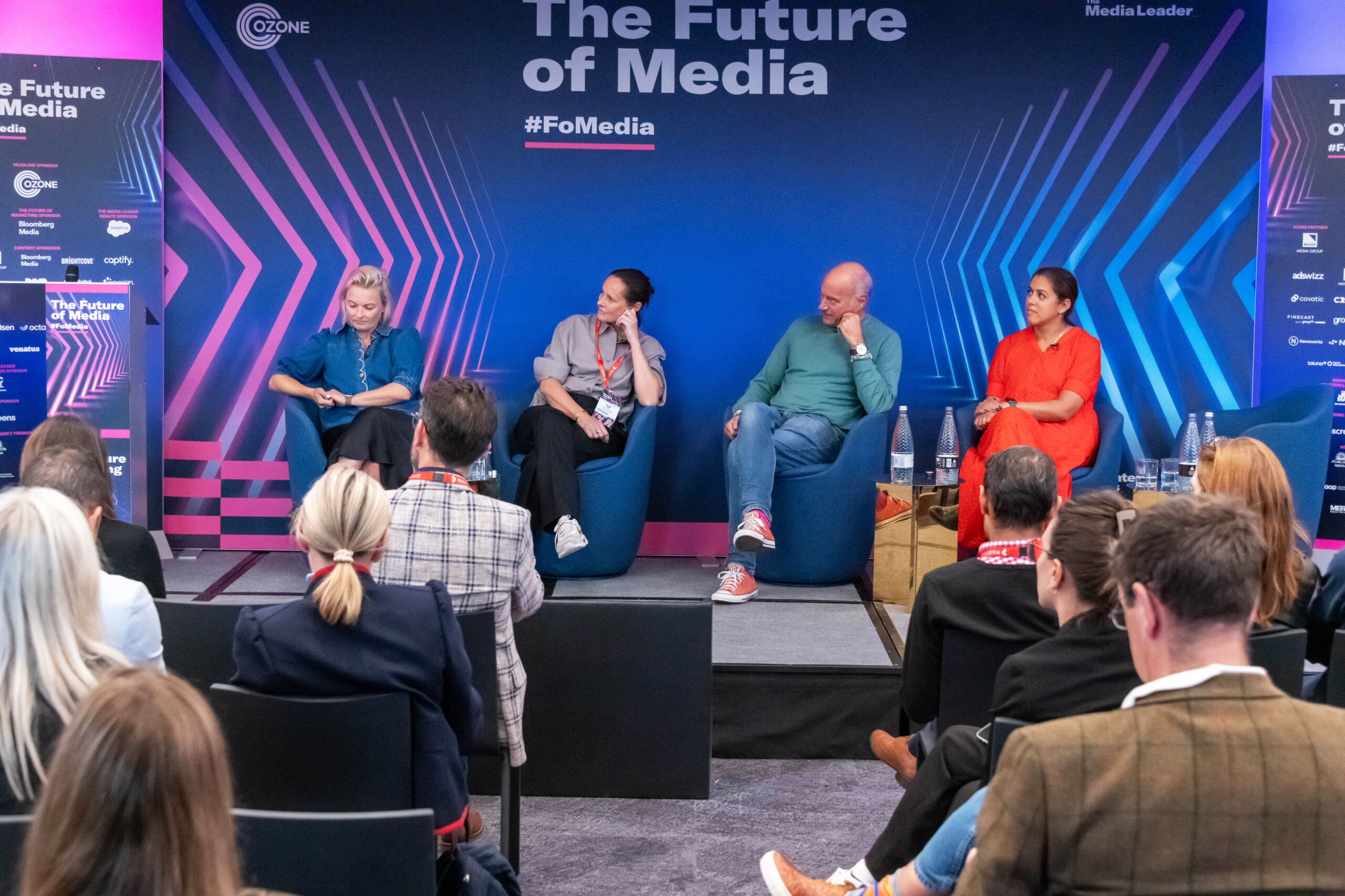Fishbowl Live: Commercial chiefs split on hybrid working

The Fishbowl at The Future of Media
As our Fishbowl interview made its live debut, four of the UK’s top commercial chiefs share their perspectives on how to survive at the top level of media sales, hybrid working and what they have learned from the pandemic.
Everybody should be back in the office five days a week, declared ITV’s deputy managing director of commercial Simon Daglish at the inaugural live Fishbowl interview at The Future of Media.
Daglish and fellow media owner sales chiefs Katie Coteman, GVP head of advertising sales and partnerships at Warner Bros Discovery, Imogen Fox, chief advertising officer at The Guardian, and Davina Barker, sales director at Digital Cinema Media (DCM) sat down with Marco Bertozzi, co-founder of TheZoo.London, for some unexpected questions.
Bertozzi plucked questions from media leaders out of a fishbowl on stage, the real-life incarnation of The Media Leader‘s Fishbowl Interview series which the panellists had all previously taken part in. The series poses randomly selected questions to top media salespeople, some from our own editorial team, and others from fellow salespeople, sometimes direct competitors.
The challenges posted by hybrid working and the pandemic were discussed throughout the session in various guises.
Does sales need to be in the office?
When asked if sales was a business where “people should be in the office”, the panel looked to Daglish joking he would make himself “unpopular” with his answer.
He was unequivocal, stating: “Yes, absolutely. I believe that ultimately this is a creative business. It doesn’t matter if you work in data, or whether you’re drawing pictures for the next ad, it is a creative business that survives and thrives on ideas, and ideas are born out of different thoughts that are put together by different individuals and shared to have a unified view, and when we’re not together, we are not as good at that.

“We are more disparate, we are disconnected, and we are less productive, so I’m a big, big fan of people being back in the office. Also in sales, most of what we do doesn’t come off and it’s pretty depressing if you’re sat in your bedroom and it doesn’t come off and so you’re in your pyjamas going “oh fuck, he didn’t buy it or she didn’t buy it”. If you’re together you can share that experience and bounce back quicker So it’s not a very popular comment but I think everybody should back in office five days a week, actually probably six but we’ll let them have a weekend.”
This was softened by Fox who both acknowledged “there is nothing like being together”, but stressed it was important not to forget what was learned during the pandemic.
Fox said: “I do agree with you about collaboration and ideas, and sharing and the serendipity of overhearing stuff and learning how to deal with a problem. But I also think that it’s really important that we don’t forget what we learned in the pandemic, which was there are great things about flexibility that we should not forget and bring to the workforce. Otherwise, I think some of us might be in danger of being like we remembered what it was like when there was not an option, but I think it’s important to remember that some of our sales teams haven’t experienced it. So whilst I agree with you on some stuff, it has to be tempered with a bit of the good stuff we learned as well.”
Barker added that motivating hybrid teams was “definitely” harder.
“There is a collective winning that is a joy of what we do and how we work. I don’t think that means you have to be together 24/7, but I do think that there is a joy to that and it is easier when we are together,” she explained.
Salespeople need optimism
When asked how they have “survived” running sales teams at their level, the panellists responded with qualities including resilience, a sense of humour, optimism, “controlling the controllables” and being open-minded.
Daglish told attendees: “Churchill had this great quote during the war when asked: how do you keep going? He said, well, I just keep buggering on. And I rather like that term. We’ve just got to keep going. Sales has got to be optimistic. We’ve got to be optimistic. That’s what it’s about.”
When Bertozzi asked how the leaders had dealt with the pandemic and thought about sales since with people working remotely, there were mixed responses.
Overall the panellists were glad to be back in the office with their teams, not only to celebrate their wins but to comfort each other when there are losses.
Coteman said: “We’re all really glad to be back in the office. My team really, really love being back in the office. We survived during the pandemic, we tried to make sure we did things that still felt the same, we would still have drinks on a Friday afternoon, just at home. We would try and do things that still made us feel like we worked together even though we weren’t.”
“But you can’t replace being in the same place and being able to share and learn from each other, share good ideas, share good news. There’s nothing better than being in the office when you get a big deal done, so in that sense, it’s kind of stayed the same. We are “people people” by nature, if you’re in sales I would argue.”
How do you motivate hybrid teams?
Around this subject, an audience member in the room asked these sales leaders how they keep sales teams motivated when they are not hitting revenue goals.
Coteman said that this is the year to ask that question because it’s a “tough” and “really hard” year unless you’re Facebook or Google.
Daglish answered there was not a simple answer as it depended on the relationship with the sales team, who they are, the position of the medium you work in and what’s happening to it.
He added: “Culture, which is what we’re referring to, comes from all of the individuals in your team. Yes, if you’re a leader then you lead that culture, but the culture has to come from the people. So the way that we try to do it is ask the people in their teams: what do you want to do? What do you want to get? How do you want to get there? What are your troubles? And then we try to help them through those particular issues.”

Daglish highlighted that this was “incredibly difficult” when you are working remotely, which is why he thought there are quite a lot of mental health issues as understanding how someone is feeling on a video screen compared to being in the room with them is “impossible”.
Barker talked about the importance of honesty and transparency, and breaking down the goals into something smaller and more realistic, especially if you are not going to hit the whole target.
“If you’re not going to hit that, let’s go for this [smaller goal] and celebrate the wins. If you are missing numbers normally, what are you doing well? Have you done a really creative piece of work? Have you had a brilliant client meeting? What are they doing that ultimately might not hit this number, but is driving towards your longer term success and celebrate that as you go?” she recommended.
Fox spoke about building momentum and staying positive.
She commented: “Sales teams I find really work off momentum, so as soon as you start celebrating something, guess what, it gets better. And also don’t let them think there’s no hope, because there is money out there, so let’s get it! There’s that mentality as well. You have to stay positive.”
Bertozzi said that the audience was witnessing “some very nice sales bosses” as he had worked for some who would not have answered the question that way.
Daglish joked to him: “We used to have a saying, which is ‘the beatings will continue until morale improves’.”
You can watch the full session below.
Read more Fishbowl interviews here and see what media’s top salespeople say about working in the industry and what concerns their clients. To suggest an interviewee, contact [email protected].




